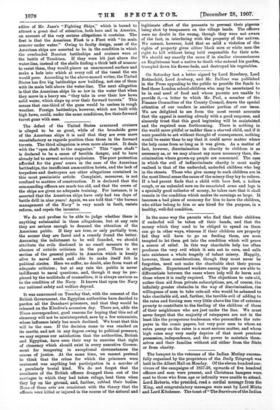It was announced on Tuesday that, with the consent of
the British Government, the Egyptian authorities have decided to pardon all the Denshawi prisoners, and that they would be released on the Khedive's accession day. There are, adds the Times correspondent, good reasons for hoping that this act of clemency will not be misinterpreted, save by a few extremists, whose influence lately has much declined. We trust that this will be the case. If the decision come to was reached on its merits, and not in any degree owing to political pressure, we may express our satisfaction that the authorities, British and Egyptian, have seen their way to exercise that right of clemency which should exist in every executive Govern- ment for tempering in exceptional circumstances the course of justice. At the same time, we cannot pretend to think that the crime for which the prisoners were sentenced was anything but participation in a murder of a peculiarly brutal kind. We do not forget that the assailants of the British officers dragged them out of the carriages in which they had taken refuge, beat them when they lay on the ground, and, further, robbed their- bodies. None of these acts are consistent with the theory that the officers were killed or injured in the course of the natural and
legitimate • effort of the peasants to prevent their pigeons being shot by trespassers on the village lands. The officers were no doubt in the wrong, though they were not aware of the fact, in interfering with the property of the natives. We cannot, however, hold that so mild a violation of the rights of property gives either black men or white men the right to kill without being held responsible for their acts. We should say exactly the same if in similar circumstances an Englishman beat a native to-death who entered his garden, trampled down his flower-beds, and destroyed his vegetables.


































 Previous page
Previous page